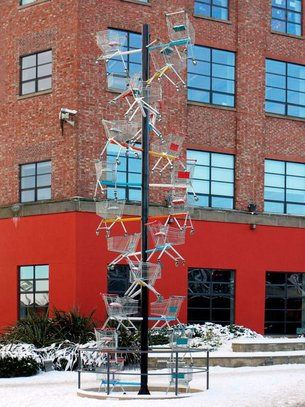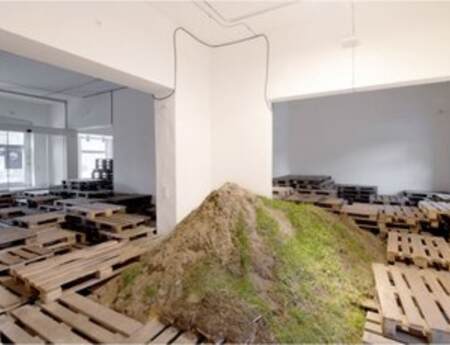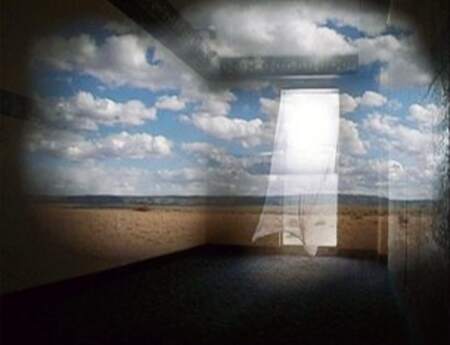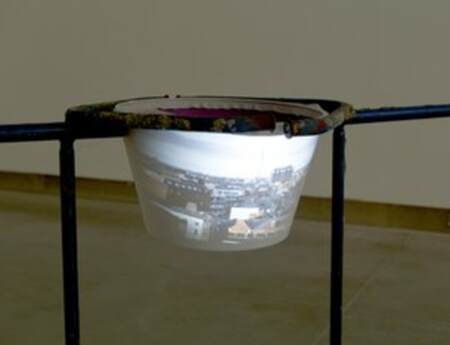“Oh Shit!”: Risk and British Sculpture Today
A curators' thoughts on sculpture being made in Europe today. By Marsha Bradfield

Richard Wilson’s Slipstream was unveiled this April in Heathrow’s Terminal Two. This writhing aluminium sculpture is purportedly the longest piece of permanent art—and the largest privately funded sculpture in Europe to boot. (1) But for Wilson, these bragging rights are secondary to the sculpture’s impact: "I wanted to stop passengers in their tracks and make them go 'Oh shit!'"(2).This comment points to risk as a growing preoccupation in British sculpture post-YBA.In fact, it was Wilson himself who, back in June of 2013, alerted me to risk as a pressing concern, when he launched Pangaea Sculptors’ Centre’s nomadic season of six sculpture-related events. While touring his public art commission, Slice of Reality, a modified sand dredger moored on the Greenwich Peninsula, Wilson addressed a crowd of aspiring sculptors. He described with wit and candor the challenges of realising long-term and large-scale projects with multiple stakeholders. With so many unknowns, failure is as likely as success.
Those who survive in the art world tend to see risk tolerance as creatively managing risk instead of mitigating it. While these things aren’t mutually exclusive, risk aversion flies in the face of artworlders’ cherished belief that contemporary art is the enclave for cultural experimentation.

This distinction drives Pangaea Sculptors’ Centre. The London-based initiative aims to support sculptors and other artists working three-dimensionally to realise ambitious projects by providing workshop facilities, technical expertise and flexible studio spaces. PSC is seeking a permanent base en route to realising its unapologetic ambition of becoming the UK’s sculptural hub. In the interim, the Centre is identifying innovative practices that cultivate risk in diverse ways, with the scale and complexity of Wilson’s being only one exemplar.
Consider Abigail Fallis. Her sculptures challenge contemporary art’s sacrosanct value of the readymade by humorously recycling objects, commenting on the environmental impact of our consumerist-led society. However visually seductive, works like DNA DL90, a doublé helix of shopping trolleys, risk pricking our conscience, making Fallis’ practice vulnerable to being dismissed as a public service in contrast to creating contemporary art.
And then there is 2013 Turner Prize winner Laure Prouvost. Her video installation Wantee is a tribute to her imaginary grandfather, a close friend of Kurt Schwitters. This may be a fiction, but it’s a fact that Prouvost’s installation anthropomorphises sculptural objects, exploring how personal relations can enhance an object’s aura and how sculpture organises social relations.
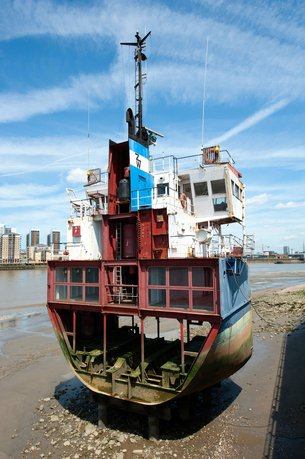
While Prouvost’s, Fallis’ and Wilson’s commitments vary, all three artists embrace risk head on. This outstrips issue-based criticality, with their practices operating at a metalevel to query the definition and function of British sculpture today. Some would argue that established artists like these are better placed to shoulder greater risk. But when compared to the YBAs, who still cling to shock as their modus operandi it seems that what Prouvost, Fallis and Wilson inspire is something closer to awe. The “Oh shit!” their sculptures solicit speaks to the artists’ creative risk management, inspiring us to do the same by refusing to play it safe.
__________
1 Slipstream stretches 80 metres and weighing 77 tonnes, making it the longest piece of permanent art. It is also the largest privately funded sculpture in Europe, costing £2.5m. Oliver Wainright, “Richard Wilson: my giant Heathrow sculpture started in a vat of margarine,” The Guardian, Wednesday 23 April 2014.
www.theguardian.com/artanddesign/2014/apr/23/richard-wilson-slipstream-heathrow-installation
2 As quoted in Ibid.
Curator's selected artists:
Phyllida Barlow (1944, UK)
www.hauserwirth.com
Cornford and Cross - Matthew Cornford & David Cross- (both 1964, UK)
www.cornfordandcross.com
Grizedale Arts (founded in 1974, UK)
www.grizedale.org
Abigail Fallis (1968, UK)
www.pangolinlondon.com
Alex Hartley (1963, UK)
www.alexhartley.net
muf architecture/art -Katherine Clarke & Liza Fior- (founded in 1994, UK)
www.muf.co.uk
Rachel Pimm (1984, Zimbawe)
www.rachelpimm.com
Laure Prouvost (1978, France)
www.laureprouvost.com
Public Works -Andreas Lang & Torange Khonsari- (founded in 1999, UK)
www.publicworksgroup.net
Richard Wilson (1955, UK)
www.richardwilsonsculptor.com
Marsha Bradfield
Postdoctoral Fellow at Chelsea College of Arts, University of the Arts London
Co-director of Pangaea Sculptors' Centre.
www.pangaeasculptorscentre.com
Facilitated by Marsha Bradfield (Curator) and Lucy Tomlins (Producer), ON YOUR MARKS took place in and around London between July 2013 and January 2014. This nomadic season of events aimed to support the practice of sculpture through programming that explored perceptions of three‐dimensional art making today. Through tours and discussions, workshops and screenings, we engaged sculpture from diverse and even contradictory perspectives.
Event 1: Tea and a Slice of Reality with Richard Wilson (June 2013).
Event 2: True Or False: There’s No Such Thing as Sculpture.
A curated conversation with Liliane Lijn, Elizabeth Neilson, Ossian Ward, Toby Ziegler and Sacha Craddock as Chair (July 2013).
Event 3: Sculptour: A tour of Roche Court (August 2013)
Event 4: How did you do that? An Artistic Skillshare, part of the Art Licks Weekend (October 2013)
Event 5: Both Sides Now: Exploring architectural proposition as an approach to sculptural production through a two-day workshop on pouring concrete (December 2013)
Event 6: Are you sitting Down: A screening of sculpture in/as moving image (January 2014)
Co-curator of The Chosen, The Red Gallery, London UK (August 2011)
Curator of influx for Hackney Transients Art Project, London UK (2008-2009)
If you would like to contact Marsha Bradfield please write to info@sculpture-network.org
